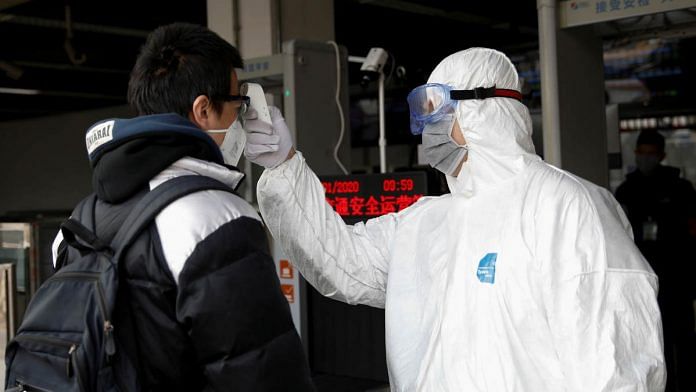New Delhi: As the COVID-19 pandemic expands and the disease progresses, the world has been witness to an overwhelming number of deaths taking place every day.
These include many health workers who have succumbed to the deadly virus, mainly due to lack of adequate protective gear.
Scientists across the world are in a race to find a treatment for coronavirus, including a supercomputer that has identified chemicals which can stop the virus from spreading.
ThePrint brings you the top developments taking place from around the globe.
Also read: Why a 3-year-old in Kerala being diagnosed with coronavirus is a crucial statistic
13 Italian doctors die battling coronavirus
Compelled to work without adequate protective gear, 13 Italian doctors have died from coronavirus and at least 2,629 health workers are infected. Italy is one of the world’s hardest-hit countries by the coronavirus pandemic.
Infected health workers make up over 8.3 per cent of total cases in Italy.
The country’s healthcare system has been overwhelmed by coronavirus cases, compelling it to practice triage — where doctors leave older patients, who are “too sick”, to die in order to conserve resources for those more likely to survive the infection.
UK to start coronavirus vaccine trials next month
The UK is all set to start human trials for a coronavirus vaccine next month, and fast-track efforts to make it available by the end of the year.
According to reports, researchers at Oxford University will test the UK’s first coronavirus vaccine in animals next week at the Public Health England (PHE) laboratory.
If successful, it will be tested on humans.
The vaccine uses a harmless virus to insert DNA from the coronavirus into human body cells. Once inside, copies of the ‘spike protein’ present in the coronavirus will be produced within the cells.
This will trigger the body’s natural immune response against coronavirus infection.
Researchers believe the vaccine will work with a single shot.
Also read: How countries worst hit by coronavirus are effecting lockdowns to deal with the pandemic
Blood test may reveal how people grow immunity to COVID-19
Researchers from the Icahn School of Medicine in the US have developed a simple SARS-CoV-2 antibody test that can be easily replicated in laboratories.
Describing their research in a preprint paper, which is yet to be peer-reviewed, the team has said that their test can reliably identify coronavirus antibodies in a person’s blood serum.
Using this test to screen thousands of people can help understand how far the pandemic has travelled and how patients start to develop antibodies to the virus.
In the future, this test may also help identify people whose antibody-rich blood serum may help treat critically-ill patients.
Supercomputer identifies potential drugs
The world’s fastest supercomputer has identified 77 chemical compounds that may effectively stop the novel coronavirus from infecting host cells.
IBM’s supercomputer Summit, equipped with artificial intelligence, ran 8,000 simulations to analyse which drug compounds could bind to the ‘spike protein’ of the coronavirus — potentially stopping the virus from infecting host cells.
While this does not mean that a cure for the virus has been found, the supercomputer has narrowed down choices of drugs for researchers.
The study, published in the preprint journal ChemRxiv, could help researchers find a treatment for COVID-19
How to operate building services in times of COVID-19
The Federation of European Heating, Ventilation and Air Conditioning Associations (REHVA) has published guidelines on how building services in areas with a coronavirus outbreak should operate to minimise the spread of the infection.
The body recommends buildings to switch on ventilation systems round the clock, or at least extend the operation of ventilation systems as much as possible.
Ventilation rates should be switched to low power when people are absent in order to remove virus particles out of the building.
Exhaust ventilation systems of toilets should be kept on 24/7.
In buildings without mechanical ventilation systems windows should be kept open for at least 15 minutes before somebody enters, especially if it was previously occupied by others.
However, such places should not keep windows in toilets open as it will encourage contaminated airflow from the toilet to other rooms.
Also read: Why fatigue will be the carrier of the second coronavirus wave



